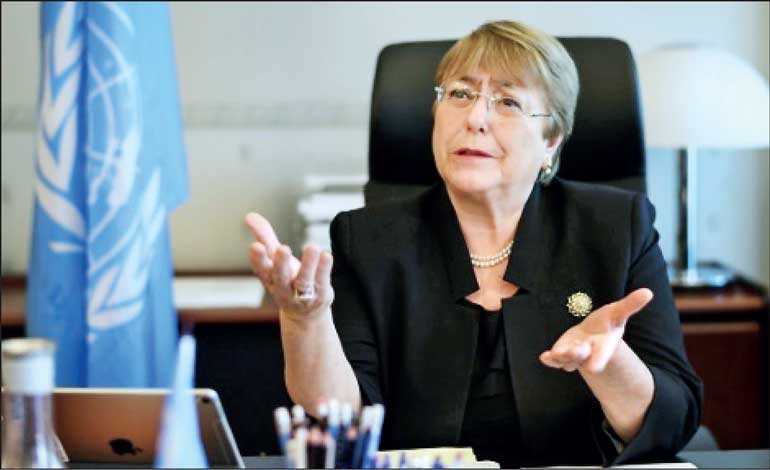Monday Feb 16, 2026
Monday Feb 16, 2026
Friday, 14 January 2022 00:00 - - {{hitsCtrl.values.hits}}

UN Human Rights High Commissioner Michelle Bachelet
 For a people in the throes of multiple existential crises, Geneva no longer seems as urgently gripping nor evocative of either patriotic protestation or demands for justice and reparation. War crimes, accountability and the like seems like yesterday’s news for a nation standing in queues for its staples. While food insecurity, breakdown in the provision of gas and electricity and US dollar-related anxieties preoccupy the masses, there’s nothing like the same interest with which the sessions of the UN Human Rights Council are usually greeted.
For a people in the throes of multiple existential crises, Geneva no longer seems as urgently gripping nor evocative of either patriotic protestation or demands for justice and reparation. War crimes, accountability and the like seems like yesterday’s news for a nation standing in queues for its staples. While food insecurity, breakdown in the provision of gas and electricity and US dollar-related anxieties preoccupy the masses, there’s nothing like the same interest with which the sessions of the UN Human Rights Council are usually greeted.
And yet, here we are, just weeks away from the High-Level Segment of the UN Human Rights Council, where Michelle Bachelet, the UN High Commissioner for Human Rights is expected to present a devastating report on Sri Lanka’s human rights record. It is also going to be a very decisive one for Sri Lanka, or rather some Sri Lankans, given that this report comes as a result of a resolution adopted at the Council in March last year, giving her Office new powers and a brand-new mechanism, all to do with Sri Lanka.
The SLAP
In 2021, the Human Rights Council mandated through Resolution 46/1 the creation of an unprecedented new mechanism on Sri Lanka, authorising the Office of the High Commissioner for Human Rights (OHCHR) to gather evidence on abuses of human rights and related crimes in Sri Lanka.
The UN calls it the “Sri Lanka accountability project”. They are careful not to capitalise all the words. If they did, and turned it into the habitual UN anagram, it would spell SLAP. Which indeed it was when the resolution creating that SLAP was passed last year in the face of protests by the Government of Sri Lanka delegation.
I can’t help but smile at the implied censure, even if they were to claim it was completely accidental. One has to admit that it was inspired.
The scope of SLAP has been clarified by the Human Rights High Commissioner’s Office as consisting of 4 tasks:
That last task is one that needs to be taken note of. If any state with the competent jurisdiction initiates legal proceedings, SLAP will provide the evidence it has gathered in support of that effort. This will make a significant difference to any state considering such a move, and the evidence itself will be treated with due seriousness since it comes from a UN agency.
How is information for this purpose to be gathered? They will “collect information and evidence from all sources willing to provide it, including Governmental authorities, other Member States, victims, witnesses, civil society stakeholders and any other sources of relevant material.” (OHCHR Website)
In addition, the OHCHR says, “Various UN bodies have already gathered extensive documentation of serious violations and abuses of human rights and violations of humanitarian law committed in Sri Lanka, particularly during and after the armed conflict, which ended in 2009.”
The funding for the project which comes from the UN regular budget has been formally approved. While they started initial preparations in 2021, the full team is expected to start early this year, 2022. It’s best for those concerned to take this seriously and game it through to its logical conclusion in preparation for inevitable legal proceedings.
Michelle Bachelet’s written report
The Human Rights Council session is scheduled to start on 28 February and end on 1 April. UN Human Rights High Commissioner Michelle Bachelet is due to present a formal written report on Sri Lanka, incorporating her oral update last year. That update informed the Council of a number of serious human rights concerns she had regarding Sri Lanka’s current conduct, as her mandate didn’t restrict her to the period of the war and its aftermath. She will no doubt also update the Council on the progress of SLAP.
One can be certain that the current state of affairs in the country will feature in her report, extending the already long list of recommendations she had included in her oral update of 2021.
This report will be presented to an audience of delegates including Ministers of Foreign Affairs and Justice and possibly even Heads of State, unlike at other sessions where Ambassadors represent the country. Whatever is in store for Sri Lanka will be presented to high-level delegates.
Parliament’s role in human rights
Another notable obligation for Sri Lanka this year is the National Report on Human Rights for the UPR. The UPR or the Universal Periodic Review is a process in which all member states of the UN are peer-reviewed every four years on the basis of a National Report produced by the country under review.
The tentative reporting deadline is October 2022. It is the Ministry of Foreign Affairs that is currently responsible for producing this report, and has been so since the Ministry of Human Rights was scrapped.
In this process leading up to the review, the UNHRC expects the Parliament to have played a role. The logic is that the “legislative, oversight and budgetary powers provide them with the tools to ensure that human rights are protected and promoted for all” (OHCHR).
Whether the Sri Lankan Parliament takes this responsibility seriously is debatable. The Council believes, “Parliaments are instrumental in making sure that the recommendations coming out of the international human rights mechanisms, including the UPR and the special procedures of the Human Rights Council and the treaty body system, are translated into national legislation and policies and are implemented at the national level.”
In fact, it has gone further and the Council’s resolution 35/29, “encouraged States to promote the involvement of parliaments in all stages of the UPR process.”
For those parliamentarians to whom this comes as a surprise, there is a document produced by the office of the High Commissioner called ‘Universal Periodic Review: The specific role of Members of Parliament before – during – and after the review’.
The office of the High Commissioner together with the Inter-Parliamentary Union (IPU) have held several regional seminars in Asia, Europe, Latin America and Africa to discuss good practices on Parliamentary engagement with the UPR process.
A recent virtual global workshop for parliamentarians organised by the Inter-Parliamentary Union (IPU) and the Office of the United Nations High Commissioner for Human Rights (OHCHR) over two half-days in June 2021 called “COVID-19 pandemic recovery through a human rights lens: What contribution from parliaments?” did NOT list Sri Lanka among its participants. Our neighbours India, Pakistan and Bangladesh did, as did many others such as China, the UK, Switzerland, and Thailand to name a few.
At the review, at which the National Report will be taken up at the UN Human Rights Council’s UPR Session in Jan/Feb 2023, a troika appointed by the Council will examine if the recommendations by the Council which the country concerned accepted at its last review have been implemented and if progress has been made on other human rights related issues.
Parliamentary Human Rights Committee
Pursuant to a worldwide survey conducted by the Office of the High Commissioner, they have developed a set of international principles on Parliaments and Human Rights. These principles are for “guiding parliaments in the setting up of parliamentary human rights committees, as well as in ensuring their effective functioning and key responsibilities.” (OHCHR). Some parliaments already have set up such committees. Sri Lanka as yet, has not thought it necessary.
Despite the space given to Civil and Political Rights in most discussions on Human Rights in Sri Lanka, Economic, Social and Cultural rights are recognised as of equal importance. Such Rights include Right to Food, Right to Health, Right to Housing, Right to Water and Sanitation, Women’s Rights, Workers’ Rights, and Right to Education, all areas of concern for parliamentarians representing their constituents in the legislature. The state has an obligation to facilitate the enjoyment of all these rights.
For instance, the trending concern of Sri Lankan economists today, namely the settlement or strategic delaying of the repayment of sovereign bonds, has to be addressed also in terms of its human rights implications. The Human Rights Council Resolution A/HRC/46/43 adopted at the same time as the SLAP resolution, titled “Question of the realization of economic, social and cultural rights in all countries: the impact of the coronavirus disease (COVID-19) on the realization of economic, social and cultural rights” under the sub-heading “From debt relief to debt sustainability”, has the following to say:
“…durable solutions are needed to secure debt sustainability of developing countries in order to create sufficient fiscal space for the realization of economic, social and cultural rights and for the implementation of the 2030 Agenda and the Addis Ababa Action Agenda.”
A Parliamentary Human Rights Committee could ensure that the human rights impact of the decisions made by the state has been adequately evaluated and conform to its human rights obligations, both local and international. They can also prevent violations and hold those recalcitrant perpetrators accountable.